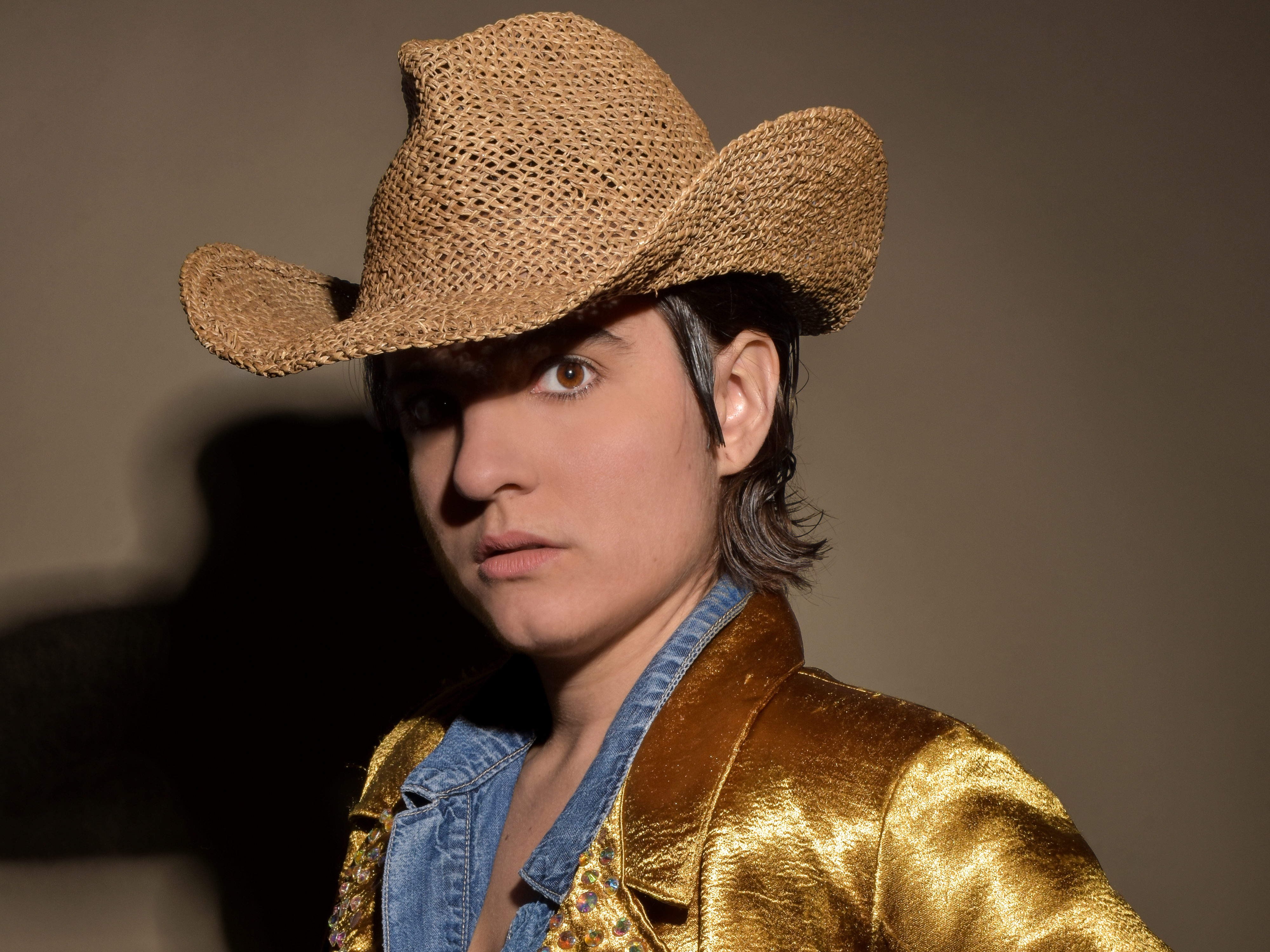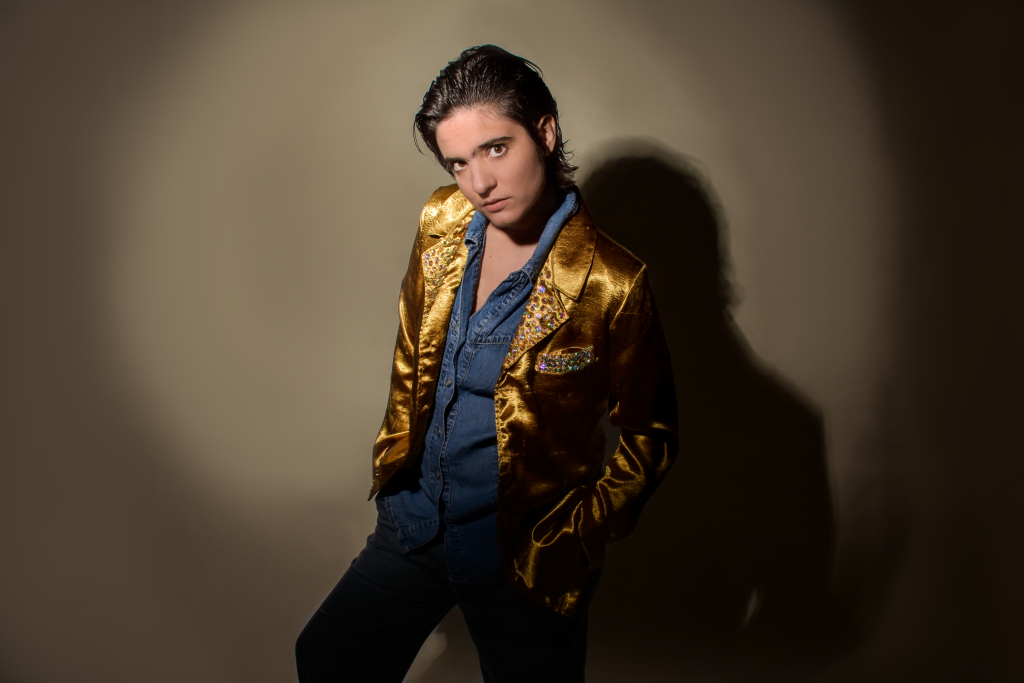Meet Gali Galó, Originator of Queernejo
By Livia Pin

Sertanejo is the country music of Brazil where, differently from country music in the United States or Canada, most artists are men (playing solo or in duos). Recently, women have taken it by storm and created “feminejo” (wordplay on feminist sertanejo). Even more recent is queernejo.
It all started in 2019 when Gabeu released the single “Amor Rural”. In the last couple of years, we saw the rise of acts such as Gali Galó, Alice Marcone, Reddy Allor, Bemti and Zerzil, as the queernejo movement started to take form. In October 2020, the first queernejo music festival, Fivela Fest, was live-streamed.
We talked to Gali Galó, singer, songwriter, and one of the organizers of Fivela Fest, about queernejo – and much more.
Can you introduce yourself to those who don’t know you?
I’m Gali Galó, singer, songwriter, and businessperson. I play queernejo, a sertanejo subgenre. It’s music that talks about being LGBTQIA+ and we also mix it with other music genres, like pop, indie, and brega, that are music genres we had as a reference while sertanejo was such a sexist and cis-heteronormative environment.
Besides my singing career, I created SÊLA, a label for women in music, and Fivela Fest, the first queernejo festival in Brazil.
You didn’t start in music playing queernejo, you had a career in indie rock and were the creator of SÊLA, right? Could you talk about it?
I started writing. Writing came before singing. The writing was a big part of me, I’m also an editor, journalist, and I work in advertising. So I started writing my songs and those took the form of indie rock because I ended up in the independent music scene in São Paulo.
Indie rock welcomed me, I released an album by Camila Garofalo, my previous stage name. I started in indie rock and then went deep in search of my roots. It’s been 4 or 5 years now I’ve been searching for the queernejo that I’m making today.
Yes, I created SÊLA, a label for women in music, and it’s crazy to share this artistic persona and this business persona. When SÊLA started, for a long time, I stopped my music career. For three years I had to really dedicate myself to the label. We released many projects, like exhibitions, festivals, mini-documentaries, SÊLA Sessions, an SÊLA compilation by female music
producers, many projects that took a lot of my time, energy, and dedication.
And that was before I realized I am non-binary. I have this lived experience as a woman and I feel like a woman sometimes, I consider myself gender-fluid, so SÊLA is a project I am very happy and proud to have made.
[bandcamp width=350 height=442 track=2005027591 size=large bgcol=ffffff linkcol=0687f5 tracklist=false]
And how did Gali Galó come about? Did you know queernejo artists before you started making these songs?
Gali Galó came about just after this time with SÊLA. When I had the time to rest and think about my music career again, I understood I had to be born again in it, so I changed my stage name.
I looked for a numerologist, started searching for stage names, and that took me a long time, about three or four years. It also took me a long time because I was trying to understand it.
Eventually, I figured out I wasn’t just searching for a stage name, but I was also searching for my new name, you know? I was searching for my non-binary name, I wanted an androgynous name.
So Gali came from this mix of understanding who I am and understanding the kind of music I wanted to make and queernejo came after that.
The term queernejo was created by you, right? It’s kind of about LGBTQIA+ artist “making peace” with their own culture, right?
Yes, the term queernejo was created by us, Gabeu and me actually.
Gabeu had come up with pocnejo and I followed him on the internet. He had just released “Amor Rural” and I was paying a lot of attention to it, I thought I had to meet him because I understood what he was making and I was making something similar.
And it’s just like you said, it’s kind of making peace with our own roots, making peace with sertanejo after going through so much and being marginalized in other music genres. We understood we could, in fact, be part of that movement.
So I sent Gabeu a message saying I wanted to meet him and we met during “SIM São Paulo” (International Music Week). There we became friends, identified with each other and I asked him to be my partner in Fivela
Fest right away. I already had the name because it made so much sense to me (fivela = buckle).
It would be the first queernejo festival in Brazil, and that’s when we came up with the term. If pocnejo was for “fags” (literal translation for “poc”) in sertanejo, then queernejo would include all the LGBTQIA+ community.
Queernejo artists pay a lot of attention to aesthetics, right? Clothing, performance….we see that a lot in your music videos too.
I believe queernejo artists take ownership of aesthetics so we can deliver a complete product. And I’m sure LGBTQIA+ people end up being instigated by life so their creativity surfaces in a more intense way, even in dangerous ways, I would say.
So I believe not only clothing but the lyrics, music production… I believe all aesthetics in queernejo is very well thought out, we don’t do anything by chance. Our awareness is aesthetic as much as it is political. We know exactly what we want to deliver, so we are careful with these signs.

And coincidentally or ironically Gabeu, Alice Marcone, Zerzil, Bemti, Reddy Allor, I believe everyone already has a connection to arts and visual arts.
We have no prejudice against different music genres and different languages.
If in music production we take on a language that mixes pop and sertanejo, that mixes brega and indie rock, we will also include in this aesthetic visual elements and other languages that will enrich the narrative we want to deliver.
By the way, can you talk about the singles you’ve released so far? It is the same artist, the same musical style, but they’re pretty different.
Yes, they’re very different from each other because they are from those three or four years I didn’t release anything, so they’re songs written in different moments and I wanted to show those differences before releasing an album.
I believe that when the album is released I will be able to deliver the language I imagine to Gali Galó more clearly. But here I wanted to show that Gali Galó can go from psychedelic rock to arrocha, which is “Fluxo (Mulher do Futuro)”.
It’s brega music and it has some psychedelia but at the same time, it’s ruled by sertanejo, the way of singing, the melodies, instruments, and arrangements.
Will these songs be part of your first album? What can you tell us about it?
Only “Fluxo (Mulher do Futuro)” and “Caminhoneira” will be part of the album- I’m spoiling it for you.
“Raiz” is pretty distinct because it was the first one to be recorded though it was the last one to be released. So “Fluxo (Mulher do Futuro)” and “Caminhoneira” will be on the album along with eight new songs.
The album is a compilation of everything I wrote in the past five years and a lot of things that are already in the past. Gali has reinvented themselves a lot during this time and today I can find a curatorial line inside this whirlwind that is making peace with your roots, understanding
exactly who you are, your gender, where you came from, anyways.
Well, not exactly who you are because I think I still have a long way until I find out exactly who I am and the millions of genders that exist in the non-binary spectrum. I also think it’s complex to fixate such a thing.
But I believe it’s a good picture of my current walk, it speaks exactly about queernejo, about how I am glad I found people who are making similar things, and how this music is already part of such a strong movement.
In October 2020, the first edition of Fivela Fest was live-streamed and you were one of the organizers. Could you talk about it?
Making Fivela Fest was one of the most amazing experiences in my life.
Both as an artist and as a businessperson.
Not only did it bring together artists who had a movement similar to mine and who raise the LGBTQIA+ flag, which is something that comes first in my debates and my music, but also we got to understand the market, how the public is thirsty for this topic and how interested they are.
Sertanejo being the most popular musical genre in Brazil, and so heteronormative, cis, and white, we understand that making queernejo is not like making pop music, which is LGBT- friendly. Pop music welcomes LGBTQIA+ people, it’s like a comforting hug, sertanejo doesn’t. So we needed to take this first step, it strengthened us as a group and as a movement.
I believe in the upcoming editions we will find out about new artists, just like this first one with Mel & Kaleb, the first queernejo duo of Brazil. They got together to perform at the festival and went on making [online] shows and will release their first EP soon.
So Fivela Fest was an amazing adventure. And making and producing it along Gabeu and Alice Marcone, who are incredibly smart people that I admire so much, I believe was also very enriching for my personal experience.
Trying to end the conversation with a bit of optimism, what can we expect from Gali Galó in the near future?
Well, in the near future we can expect this album so long ago I promised I would release. But it’s on its way, we’re in pre-production and soon will start recording. I hope we can release it in the first semester.
And music videos. As you said, aesthetics are very important.
I think we, LGBTQIA+ people, are keeping an eye on what’s happening, on trends, we have to be, we need to use all the tools that are within our reach so we can deliver an interesting work and message.
And, of course, the queernejo in Fivela will only grow and our group is consolidated. We’re close friends, we share experiences and I think queernejo came to stay and came to disrupt also.
Livia Pin writes for the Portuguese-language music blog busridenotes.com.br
